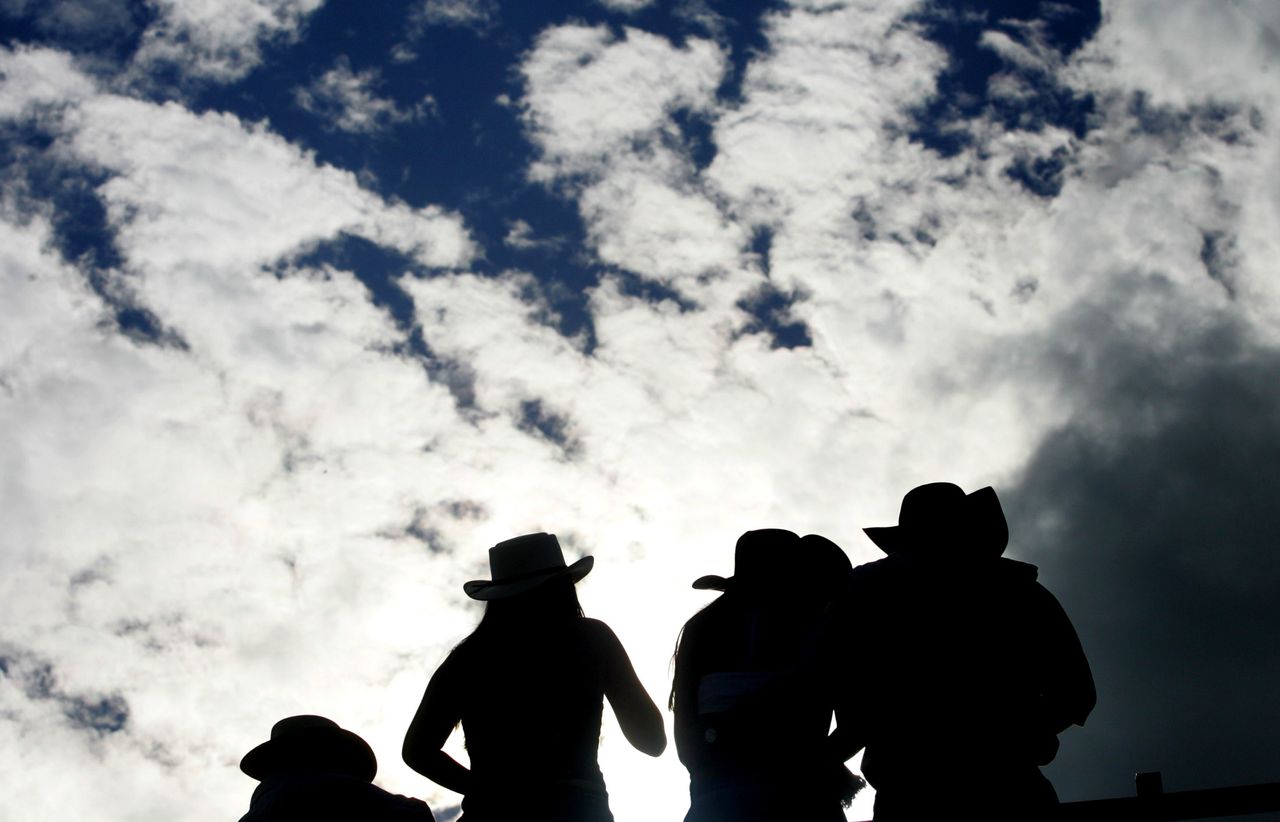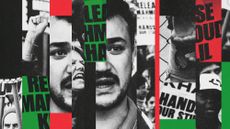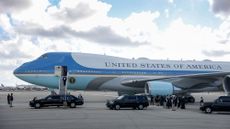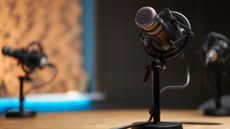The rise and fall of Olympic rodeo
For a brief moment, cowboys and cattle found themselves in the spotlight of the sporting world


It didn't seem like the craziest idea. After all, prior Olympic Games had included tug-of-war and ski ballet, even an ill-fated push for motor boating. Equestrian sports had been included since 1900.
So why not rodeo?
The fleeting push to include rodeo in the Winter Olympics all started in 1986 with a saddle bronc rider named Winston Bruce. Described by the Calgary Herald as "the man who would become famous for making the Calgary Stampede an event known around the world," Bruce had a knack for showmanship and the ambition to fight for the sport to be taken seriously on the global stage.
Subscribe to The Week
Escape your echo chamber. Get the facts behind the news, plus analysis from multiple perspectives.

Sign up for The Week's Free Newsletters
From our morning news briefing to a weekly Good News Newsletter, get the best of The Week delivered directly to your inbox.
From our morning news briefing to a weekly Good News Newsletter, get the best of The Week delivered directly to your inbox.
As the Stampede Rodeo manager at the time, Bruce was tasked with bringing hundreds of thousands of spectators annually to the exhibition's grandstands in Alberta. The Olympics seemed like a natural next step in his promotion of the sport. As Mike Whittle, the Canadian rodeo spokesman at the time, put it to The Palm Beach Post in January 1988: "[Me and Bruce's] dream is to see the Russians against the United States in a rodeo."
Whittle's comments came just a few weeks before the Winter Games in Calgary, where demonstration sports like curling, freestyle skiing, and short track speed skating were making their auspicious Olympic debuts. Rodeo's debut, meanwhile, was relegated to the Olympic Arts Festival, a cultural sidebar event that lacked the same official standing as demonstration sports. Instead, the "Challenge Cup," as the rodeo demonstration was called, got lumped alongside displays of Native arts, hockey goalie masks, and a performance of Porgy and Bess by the Calgary Opera.
The rodeo world, though, held its breath and crossed its fingers that the Arts Festival demonstration could be the first step to becoming a full Olympic sport. "This is the first time in the 51-year history of professional rodeo that we've ever been invited to participate in the Olympics," the director of rodeo administration for the Professional Rodeo Cowboys Association (PRCA), T.J. Walter, told ProRodeo Sports News. "Rodeo is one of the most popular sporting events in the Western world and it will receive television exposure in 144 countries. That much exposure will help create a worldwide interest in the sport of rodeo and that makes this an exciting opportunity."
The rodeo showcase was a huge success, selling out every night. And while only two teams would compete — Canada vs. the USA — the top three winners in events including saddle bronc, bull riding, and calf roping received Olympic Arts medals, broken up in tiers of gold, silver, and bronze, just like real Olympic athletes. The champions in each event also received prize money and, of course, a belt buckle, for their efforts.
Sign up for Today's Best Articles in your inbox
A free daily email with the biggest news stories of the day – and the best features from TheWeek.com
Whittle and Bruce might not have seen the Soviet Union face the U.S., but they did earn the attention of other major athletes. "After attending a hockey game, [World Champion Bull Rider Tuff Hedeman] remembers well a visit to the Team USA cowboy locker room by Soviet hockey legend Vladislav Tretiak, who talked with the American cowboy contingent through an interpreter," writes American Cowboy. "After watching the rodeo, the hulklike goalie declared rodeo 'much more dangerous' than hockey."
The cowboys themselves reveled in the newfound international attention for their sport. Canadian bareback rider Robin Burwash called the 1988 Olympics "the best thing that's ever happened to rodeo." Added Hedeman to American Cowboy in 2001: "Of all the things I ever did rodeoing, the Olympics was one of the neatest things I ever did. At the awards ceremony, we stepped up on that platform to get our medals in front of 90,000 people. The whole world was watching. How do you describe that feeling?"
But not everyone was so taken with the sport. The New York Times observed "a chorus of protests from beef-eating European visitors here for the Olympics has appeared in the local press, complaining about North American cruelty to broncos, buffaloes, calves, and steers."
It would be over a decade before rodeo returned to the Olympics. The 2002 Winter Games in Salt Lake City, though, which marked the first return to North America since Calgary, seemed like the perfect opportunity to clinch the sport as an Olympic staple. The entire Games, in fact, took on an Old West vibe:
PRCA Commissioner Steven J. Hatchell voiced the optimism of the entire rodeo community in the months ahead of the second Olympic demonstration: "This is a tremendous opportunity for the sport of rodeo to play not only before audiences from North America, but around the world," he told Mid-South Horse Review. "The 1988 experience was a tremendous success."
But trouble was brewing. The three-day rodeo event was slated to take place in the small city of Farmington, Utah, in Davis County, 12 miles north of Salt Lake City. The competition would again be a part of the sidebar Olympic Arts Festival. This enraged activists at PETA (People for the Ethical Treatment of Animals) and SHARK (Showing Animals Respect and Kindness), who complained that the sport was rife with animal abuse, seeing as "half of the participants are unwilling."
As the event drew near, the protests ramped up. Demonstrators gathered outside the International Olympic Committee's headquarters in Switzerland. A Buck the Rodeo billboard popped up on 500 South. SHARK followed the Olympic torch route in a video truck "educating people about the cruelty of rodeo."
The warring factions took their battle to the president of the Salt Lake City Olympic Games Organizing Committee — none other than one Mitt Romney. "I was part of an international group that met with [Romney] … to explain to him inherent animal abuse in rodeo, particularly the roping events," said veterinarian Peggy Larson in an interview with SHARK. "My role was to provide him with veterinary medical documentation of injuries sustained by cattle in rodeos. Meat inspectors have described broken backs, broken necks, ruptured tracheas, broken bones, internal injuries, ruptured ligamenta nuchae, and gallons of blood under the skin."
Even pro football hall-of-famer Marv Levy got involved, writing to Romney: "Rodeo is something that Americans should be ashamed of. I hope you will do the right thing and cancel this bizarre, inhumane event."
But to many other Utahans, especially those in tiny Farmington, the chance to host Olympic rodeo was a point of pride. State Rep. Paul Ray (R) also appealed to Romney: "The rodeo is a very important piece of our culture here in Utah and should not be on the table for negotiations," he insisted. "We cannot allow terrorist groups such as SHARK and PETA to frighten us with threats of violence."
The "terrorist" comment, so soon after 9/11, incensed SHARK, which demanded Ray either "prove that statement or resign."
Romney ultimately cited the contract signed with rodeo officials and allowed the show to go on. "Despite the bullying tactics — no pun intended — of the animal rights activists, Mitt Romney had the sense to not cancel the Olympic rodeo as a part of the local cultural Olympiad," praised Deseret News columnist Lee Benson. "Because if rodeo ain't a part of the local culture, what the heck is?"
Activists may have lost the battle, but they ultimately won the war. Rodeo has not been seen at the Games since, despite a return to North America in 2010 with the Vancouver Games. Vancouver even took a preventative measure in 2006, with the city council unanimously voting to prohibit rodeo activities like calf roping and bucking straps. The controversy-averse International Olympic Committee will likely not do anything itself to approach rodeo again.
For the cowboys, though, the brief ride was exhilarating. "I think about riding in the Olympics every day," bull rider Cory Check told American Cowboy. Added World Champion All Around Cowboy Joe Beaver: "Gold medals are something special. They aren't just another saddle hanging in the corner."
Jeva Lange was the executive editor at TheWeek.com. She formerly served as The Week's deputy editor and culture critic. She is also a contributor to Screen Slate, and her writing has appeared in The New York Daily News, The Awl, Vice, and Gothamist, among other publications. Jeva lives in New York City. Follow her on Twitter.
-
 What's at stake in the Mahmoud Khalil deportation fight?
What's at stake in the Mahmoud Khalil deportation fight?Talking Points Vague accusations and First Amendment concerns
By Joel Mathis, The Week US Published
-
 Why is a new Air Force One taking so long to build?
Why is a new Air Force One taking so long to build?The Explainer Trump may look for alternatives for his new plane
By Joel Mathis, The Week US Published
-
 New and notable podcasts for March
New and notable podcasts for MarchFeature The MeidasTouch Podcast and The Magnificent Others With Billy Corgan
By The Week US Published
